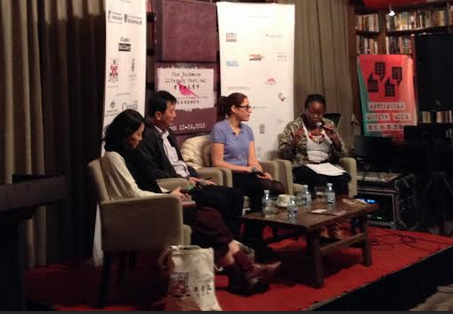Fish, fungi, kittens, and cockroaches mirror the protagonists in Mexican author Guadalupe Nettel’s psychologically incisive tales. In the fictional world of Hong Kong’s Dorothy Tse, brutal violence unfolds according to the incomprehensible but irrefutable logic of nightmares. Xi Ni Er preserves slices of a changing Singapore in his condensed, dialogue-driven micro-narratives.
“Complex literature” is not an unreasonable description for the work of any of these writers, but it is an awkwardly nebulous pretext for putting them on a stage together. At the beginning of the event, they sometimes seemed burdened by the duty to engage with the topic and valiantly attempt to define what complex literature might or might not be.
It was generally agreed upon by the panel that literature is complex because humans are also complex—more so than animals for the most part. Complex literature is probably preferable to simple literature if indeed there is such a thing. But the discussion became far more lively when they narrowed in on more specific details of their reading and writing lives: Xi talking about the ways in which Singapore’s four different languages had shaped his identity as an author; Nettel narrating her epiphanic discovery of a Marquez character who shared her homicidal inclinations towards her grandmother; Tse explaining how the fiction of Yu Hua (and his experience of the Cultural Revolution) had imbued her own work with an awareness that abrupt, inexplicable change is never far away.
In events such as this it sometimes seems like participants are merely waiting for their turn to trot out a well-groomed anecdote, but it never felt like this was the case here–partly thanks to the deft moderation of Leslie-Ann Murray, but principally because each of the authors appeared to be genuinely interested in learning what the others had to say.
This was a discussion in English between three writers who do not themselves write in English, and they all began the evening by thanking their translators. Xi offered a glimpse of the prestige that a respected translator can confer upon a writer’s international debut, when he revealed the determination with which his agent had insisted on acquiring the services of Mo Yan’s translator, Howard Goldblatt (who translated Xi’s collection The Earnest Mask in collaboration with Sylvia Li-Chun Lin). Xi seemed to take a perverse kind of pride in the fact that some of stories had apparently been deemed “untranslatable”–it would have been fascinating to learn more about what combination of factors led to such an appraisal. He also highlighted the distinctive challenges Goldblatt and Lin faced when translating a writer from a country like Singapore, where the prevalence of English meant that specific details of local language usage could occasionally come into conflict with the individual idiolect of the translators.
But in the end, it was Nettel who expressed the most empathy for translators, observing that while they regularly find themselves blamed for a work’s shortcomings, it is far rarer for them to receive praise for its strengths. “Translators,” she concluded, “are like heroes.”
Dave Haysom is the joint managing editor of Pathlight, a quarterly journal dedicated to new Chinese writing.

